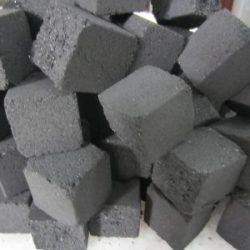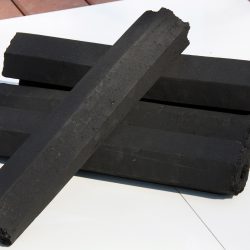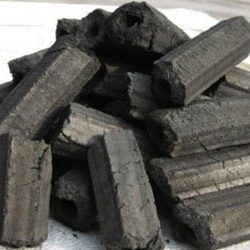Charcoal
Charcoal is a versatile substance formed when carbon-rich materials, such as wood, are subjected to high heat in the absence of oxygen, a process known as pyrolysis.
This age-old material boasts a rich history, utilized for thousands of years across various cultures for its myriad uses.
From ancient times, when it was employed in cooking and metallurgy, to contemporary applications in health and beauty, charcoal’s significance has only grown.

what is a Charcoal?
Charcoal is a lightweight black carbon residue produced by removing water and other volatile constituents from animal and plant materials.
It is typically created by a process called pyrolysis, where organic materials are heated in the absence of oxygen, leading to the breakdown of substances and leaving behind carbon-rich material.
Charcoal is commonly used for various purposes, including:
- Fuel: It is widely used as a fuel source for barbecuing, grilling, and in other forms of cooking due to its ability to produce high heat and minimal smoke when burned.
- Art Supplies: Artists often use charcoal sticks or pencils for drawing and sketching due to its rich, dark lines and ease of blending.
- Filtration: Activated charcoal is used in water and air purification systems because of its high surface area and porous structure, which allows it to trap impurities and toxins.
- Medicinal Uses: In certain situations, activated charcoal is used in medicine to treat poisoning and overdoses, as it can absorb toxins within the gastrointestinal tract.
- Soil Amendment: Biochar, a form of charcoal produced from biomass, is used in agriculture to improve soil fertility and sequester carbon.
Overall, charcoal has a variety of applications across different fields due to its unique properties.
The Manufacturing Process of Charcoal
Charcoal is typically produced through the carbonization of organic materials. The steps involved in this process are as follows:
Selection of Raw Material:
When it comes to producing high-quality charcoal, the choice of raw material plays a pivotal role in determining the final product’s characteristics. Hardwoods, such as oak and hickory, are widely regarded as premier options due to their dense composition, which allows them to burn longer and more steadily than softer woods.
These hardwoods not only provide an extended burn time but also contribute to a unique flavor profile that can enhance various culinary experiences, particularly when used in grilling or barbecuing.
The intricate grain structure of oak and hickory also lends itself to producing charcoal with desirable properties such as high heat output and minimal ash production, making them ideal for both home and commercial cooking applications.
In addition to hardwoods, alternative materials like coconut shells are gaining popularity as a sustainable and eco-friendly choice for the production. Coconut shell coal is known for its high carbon content and purity, offering exceptional heat retention and a clean burn with little to no smoke. This makes it an attractive option for environmentally conscious consumers and culinary enthusiasts alike.
Moreover, utilizing coconut shells promotes waste reduction by repurposing what would otherwise be discarded. The combination of traditional hardwoods and innovative alternatives like coconut shells allows for a diverse range of products, catering to varied preferences and usage scenarios, while underscoring our commitment to quality and environmental sustainability.
Drying:
Drying is a crucial preliminary step in the carbonization of wood, as it significantly influences the quality and efficiency of the final product. Before the wood undergoes carbonization, it is essential to reduce its moisture content to optimal levels.
High moisture can hinder the conversion process, resulting in lower yields of biochar and potentially impacting its structural integrity. Proper drying not only enhances the carbonization process but also ensures that the wood achieves the desired temperature more effectively, allowing for uniform carbonization.
This step is especially important as it prepares the wood for the transformation into biochar, a valuable substance appreciated for its environmental benefits and agricultural applications.
Various methods of drying can be employed depending on the scale of production and available resources.
Natural drying, which utilizes sunlight and air circulation, is a cost-effective option, while more controlled drying processes, such as kiln drying, can produce consistent results regardless of weather conditions.
The choice of drying method will depend on factors such as the type of wood, desired moisture content, and time constraints. Ultimately, the drying phase sets the stage for successful carbonization, yielding a high-quality biochar that can effectively sequester carbon, enrich soil health, and contribute to sustainability efforts.
By investing in thorough drying techniques, producers can ensure that they achieve optimal results in their carbonization processes and maximize the benefits of their wood-derived products.
Carbonization
Carbonization is a vital process in the transformation of raw organic materials into charcoal, a product renowned for its versatility and efficiency.
This meticulous procedure begins by placing the dried organic matter in a controlled environment devoid of oxygen, an essential condition that prevents combustion.
Instead of burning, the subject undergoes a thermal decomposition process, where heat acts as a catalyst to extract moisture and volatile compounds. As the temperature rises, these compounds evaporate, allowing the carbon content of the original material to concentrate.
The result is a dense, carbon-rich substance that not only has a high energy content but also retains many beneficial properties, making it ideal for various applications, from cooking to filtration.
The carbonization process not only enhances the functional attributes of charcoal but also minimizes its environmental impact.
By converting organic waste products into charcoal, we can effectively reduce landfill waste, while simultaneously providing a sustainable energy source.
The resulting charcoal boasts a higher heating value and lower smoke emissions compared to traditional fuels, making it an eco-friendly alternative for grilling, heating, and industrial uses.
Furthermore, the charcoal produced through carbonization can be activated to enhance its adsorptive qualities, making it a valuable component in air and water purification systems.
This multi-faceted approach highlights the importance of carbonization not just as a step in charcoal production, but as a significant contributor to a circular economy focused on sustainability and innovative resource management.
Cooling and Packaging:
After the carbonization process, which involves subjecting raw biomass materials to high temperatures in the absence of oxygen, the produced charcoal needs to undergo a critical cooling phase before it can be packaged for sale.
This cooling process is vital as it prevents spontaneous combustion that can occur if hot charcoal comes into contact with oxygen.
Depending on the production facility’s design and operational capabilities, various cooling methods may be employed.
Common techniques include air cooling, where ambient air naturally reduces the temperature of the charcoal over time, and water quenching, which involves spraying the charcoal with water to rapidly lower its temperature.
The choice of cooling methods can also affect the charcoal’s final quality and characteristics, such as its residual moisture content and the potential for reactivity.

Types of Charcoal
Understanding the different types of charcoal is vital for selecting the right one for your needs.
Here are the most common varieties:
1. Wood Charcoal
Wood charcoal is the most traditional form, typically made from hardwood.
Its robust flavor makes it ideal for grilling and barbecuing.
2. Activated Charcoal
Activated charcoal is produced by heating carbon-rich materials such as wood, coconut shells, or peat to extremely high temperatures, increasing its surface area.
This type of charcoal is widely used in health and beauty products due to its adsorption properties, which allow it to trap toxins and impurities.
3. Binchotan Charcoal
A premium Japanese form of charcoal, Binchotan is prized for its high-quality burning and ability to enhance flavors in cooking. It is often used in traditional Japanese grilling.
4. Lump Charcoal
Lump charcoal consists of natural chunks of wood that have been charred, providing a clean burn and excellent flavor for grilling.
5. Briquette Charcoal
Briquettes are made from compressed sawdust, wood scraps, and additives designed to enhance burning.
They offer a consistent burn and are often favored for their convenience and ease of use.
Benefits of Charcoal
Charcoal isn’t just a cooking fuel; it provides a multitude of benefits in various industries.
Here are some of the key advantages:
1. Health and Wellness
- Detoxification: Activated charcoal is known for its ability to bind to toxins in the body, helping to eliminate harmful substances.
- Digestive Aid: It may alleviate gas and bloating by trapping gas molecules in its porous structure.
- Skin Treatment: Charcoal is a popular ingredient in face masks and cleansers due to its ability to draw out impurities from the skin.
2. Environmental Impact
- Sustainable Production: Sourced from renewable materials, charcoal can be produced sustainably, particularly when using waste wood.
- Carbon Sequestration: When sustainably produced and stored in soils, charcoal can act as a carbon sink, helping to mitigate climate change effects.
3. Cooking Enhancements
- Flavor Infusion: Different types of wood charcoal add unique flavors to food, enhancing the overall dining experience.
- Consistent Heat: Charcoal provides a steady, high heat, making it ideal for grilling and roasting.
4. Purification
- Water Filtration: Activated charcoal is widely used in water treatment filters due to its ability to remove contaminants and chemicals.
- Air Purification: Charcoal bags are gaining popularity as natural air purifiers, absorbing odors and harmful pollutants.

Uses of Charcoal
The versatility of charcoal means it can be employed in countless ways across various fields.
Here are some of the most popular uses:
1. Culinary Applications
Charcoal is prominently used in grilling and barbecuing, giving meats and vegetables a smoky flavor that enhances dishes. It can also be used for:
- Smoking Food: Infusing food with a distinct flavor by smoking with wood chips.
- Baking: Pizzas cooked on charcoal grills often acquire a unique flavor.
2. Health and Beauty
Charcoal has carved a niche in the health and beauty industry:
- Skincare Products: Activated charcoal is a popular ingredient in face masks, scrubs, and cleansers.
- Teeth Whitening: Charcoal toothpaste is gaining traction for its purported ability to whiten teeth naturally.
3. Home Applications
Charcoal serves several practical uses in the household:
- Odor Removal: Charcoal bags or containers effectively eliminate odors from refrigerators, bathrooms, and garages.
- Pest Control: It can also deter pests by creating a less hospitable environment.
4. Industrial Uses
In industries, charcoal is utilized for:
- Metallurgy: As a reducing agent in metal smelting processes.
- Art: Used in drawing and as a medium in traditional art forms.
Choosing the Right Charcoal
Selecting the right type of charcoal depends on your intended use.
Here are some considerations:
- For Grilling: Choose lump charcoal for a strong flavor or briquettes for a longer, more controlled burn.
- For Health: Opt for activated charcoal for detoxification and skincare.
- For Crafting and Art: Look for artist-grade charcoal sticks or powders for drawing.
Other Related Products
Epal pallets
Introducing Epal pallets, the versatile and eco-friendly solution for all your shipping and storage needs. Designed to meet rigorous international standards, these durable wooden pallets are ideal for transporting goods safely and efficiently.
With their sturdy construction, Epal pallets ensure the security of your products during transit, while also being fully recyclable and sustainable, making them an excellent choice for environmentally-conscious businesses.
Whether you’re in manufacturing, logistics, or retail, Epal pallets offer a reliable and cost-effective option that enhances your operational efficiency and supports your commitment to sustainability.
Upgrade your pallet supply today and experience the benefits of using Epal pallets for your business!
Firewood
Experience the warmth and comfort of a crackling fire with our premium firewood, sourced from sustainably managed forests. Ideal for cozy evenings by the fireplace or outdoor gatherings, each log is meticulously dried to ensure optimal burning efficiency and minimal smoke.
Our firewood not only provides long-lasting heat but also enhances your space with the inviting aroma of natural wood.
Whether you’re roasting marshmallows or simply unwinding after a long day, you’ll appreciate the quality and performance of our firewood, making it an essential addition to your home or campsite. Enjoy the simple pleasures of life with a reliable and eco-friendly firewood solution.
Plywood
Discover the versatility and durability of high-quality plywood, a staple for both professional builders and DIY enthusiasts. Renowned for its strength and lightweight properties, our plywood is crafted from premium wood layers, bonded together to create a reliable material ideal for a variety of construction projects, furniture making, and interior design applications.
Available in multiple thicknesses and finishes, this eco-friendly option not only ensures stability and longevity but also adds an elegant touch to any project. Whether you’re constructing shelves, cabinetry, or decorative elements, our plywood delivers exceptional performance and aesthetic appeal, making it the perfect choice for all your woodworking needs.
Wood Pellets
Discover the eco-friendly solution for your heating needs with our premium wood pellets, crafted from 100% natural hardwood for efficient and sustainable energy.
These pellets provide a clean-burning alternative to traditional fuels, minimizing ash and emissions while maximizing heat output.
Perfect for stoves, boilers, and fireplaces, our wood pellets are easy to store and handle, making them a convenient choice for any home.
Experience the warmth and ambiance of wood heat, knowing you’re contributing to a cleaner environment with every burn. Choose our high-quality wood pellets for a reliable, cost-effective, and environmentally responsible heating option.
Safety Tips When Using Charcoal
When using charcoal, safety should be a priority:
- Use in Well-Ventilated Areas: Always use charcoal in open or well-ventilated spaces to avoid carbon monoxide buildup.
- Avoid Accelerants: Resist the temptation to use lighter fluid or other chemicals, which can introduce harmful compounds into your food.
- Store Properly: Keep charcoal in a dry, safe place, out of reach of children and pets.
Charcoal’s versatility spans countless uses, from culinary applications to health and beauty.
Its benefits extend beyond just fueling cooking fires; it has healing properties, environmental advantages, and potential for a sustainable future.
Whether you’re looking to enhance your grilling experience, explore health benefits, or uncover its industrial applications, understanding the diverse functions of charcoal is essential.
Choosing the right type ensures that you harness its maximum potential, making charcoal an indispensable addition to your life.
As we continue to discover more about the benefits and applications of this ancient material, charcoal is poised to maintain its place in modern society, evolving with our needs while providing timeless advantages.
Embrace the power of charcoal and unlock its potential to enhance every aspect of your life, from health and beauty to culinary delights and beyond.
Showing all 3 results

